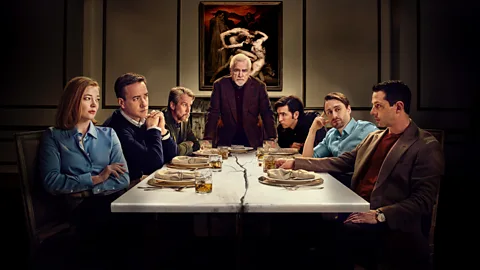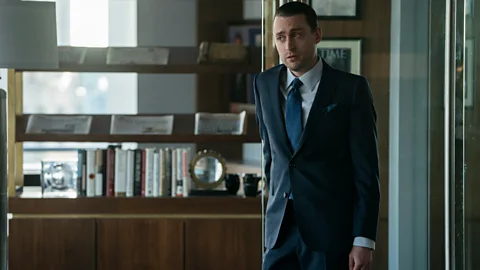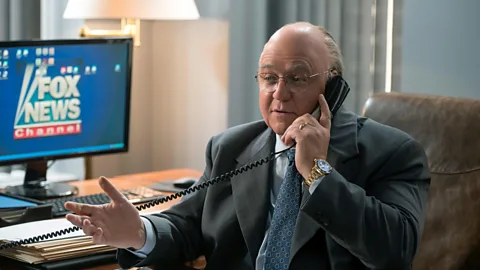HBO’s Succession and our reckoning with male monsters
 HBO
HBOAs it returns for season two, the family saga is TV’s most vital show - and among a wave of art taking a scathing look at the rich white men who rule the West, writes Hugh Montgomery.
Warning: contains spoilers for Succession series 1
Back around the turn of the millennium, when the so-called ‘golden age of TV’ began, one of the key developments was the rejection of conventionally ‘likeable’ characters. From The Sopranos onwards, protagonists became darker and more morally compromised. But twenty years on, it’s fair to say that few shows have pushed the envelope on the unlikeability front quite like Succession – HBO’s blistering show about a super-rich US family at war over their right-wing media empire, which returns for its second series next week.
More like this
The Roy clan is so hellish, you find yourself wondering: who, really, is the most damned of them all? Ashen-faced, incandescently raging paterfamilias Logan, a man whose parenting skills are up there with Darth Vader? Older son Connor, who throws tantrums over the temperature of butter, pays for a girlfriend, and with no apparent political experience or knowledge, is now running for president on an anti-elitist ticket (ahem)? Middle and youngest sons Kendall and Roman – responsible, respectively, for the death of a man in a car crash while high on drugs, and the manslaughter of many in an explosive satellite accident?
Or son-in-law Tom, an oleaginous sycophant who, in his position as Head of News, salivates over how many ‘skulls’ he can fire? It should be noted that there is a daughter, Shiv, among them, with her own lack of moral scruples – but that the very most excruciating and disturbing moments are reserved for men.
 HBO
HBOIn that respect, as well as being beautifully written, at once grimly funny and unexpectedly tragic, Succession feels like a series that could not be more in touch with the cultural moment. From the virulently misogynistic teens of Euphoria, to the abusive husbands of Big Little Lies and Dirty John, and the assorted psychopathic killers of Mindhunter, in 2019 you cannot move for portrayals of baldly toxic masculinity on television – something Succession offers up in multiples. But more specifically, it feels part of a reckoning with the particular strain of rich white men who continue to have a grip on the Western political and media establishment – and have, arguably, or very clearly, abused that power to monstrous effect.
The kernel of the idea for the show originated in a script that its creator Jesse Armstrong wrote about the real-life Murdoch family many years ago – but they are hardly unique in their combination of excessive influence and nepotistic dysfunction, and the Roys bear the influence of numerous clans from the Maxwells to, of course, the Trumps.
Abuses on left and right
In the cinema, meanwhile, Succession producer Adam McKay recently directed Vice, another work focused on the egos behind the misanthropy of the modern United States – chiefly, in this case, ex-Vice-President Dick Cheney. And running on US TV at the moment is The Loudest Voice, a biopic of Cheney’s conservative contemporary, the late Fox News chief Roger Ailes (played by Russell Crowe with a bald cap and prosthetic jowls), who whipped up hysteria as head of the Murdoch cable network before being brought down by a string of sexual harassment allegations.
But it’s not just abuses of power on the right that are being addressed: almost two years on from the allegations of serial abuse by Harvey Weinstein, the first pieces of fiction inspired by the downfall of this former titan of Hollywood liberals are emerging – the most prominent one thus far being the David Mamet play Bitter Wheat, currently playing in London. And, only this week, it’s been announced that the next series of Ryan Murphy’s American Crime Story anthology show, Impeachment, will revisit the Bill Clinton/Monica Lewinsky affair – a story of a 49-year-old man in the most powerful position in the world exploiting a 22-year-old intern, and destroying her life, even if that was not really how the salacious press coverage presented it at the time.
 Showtime/Alamy
Showtime/AlamyArmstrong emphasises that Succession, which was originally conceived back in the mists of time in late 2015, was not made with any zeitgeist in mind. “I don’t think you think like that,” he tells BBC Culture. “When you’re writing a show, it’s not how the creative process works. I guess you’re lucky if people respond to it and feel it has some kind of relationship to the time [living] in.” However that zeitgeist is also, of course, inescapable, as Lucy Prebble, the acclaimed British playwright who is a writer and executive producer on the show, acknowledges. “There’s no doubt that that’s the air that the show is breathing. It’s almost too innate to talk about it. We never really talked about it in those in the writers’ room because it’s so much part of its DNA.”
No moral centre
But while these narratives that address monstrous male establishment power could not be more important, they’re evidently not an easy sell, especially over many episodes or series. Prebble says that in the Succession writers’ room, there were discussions about whether the story needed “a character who was going to show us what the right thing to do was or who we would root for in a more traditional way.”
